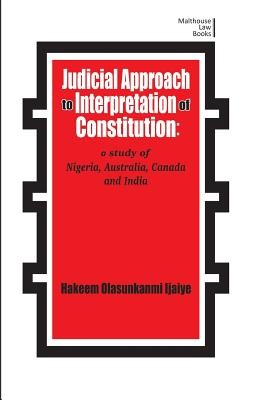
- We will send in 10–14 business days.
- Author: Hakeem Olasunkanmi Ijaiya
- Publisher: Malthouse Press
- ISBN-10: 9789584466
- ISBN-13: 9789789584468
- Format: 15.6 x 23.4 x 1.3 cm, minkšti viršeliai
- Language: English
- SAVE -10% with code: EXTRA
Judicial Approach to Interpretation of Constitution (e-book) (used book) | bookbook.eu
Reviews
Description
This book, Judicial Approach to Interpretation of Constitution: a study of Nigeria, Australia, Canada and India, is the outcome of a doctoral study of the judicial interpretation of the constitutions in selected Commonwealth jurisdictions, and a survey of the theories of constitutional interpretation and adjudication, the rules applied by the courts in the interpretation of the provisions of the constitutions, and determined the extent to which the existing approaches to the interpretation of the constitution have hindered the development of constitutional jurisprudence in those countries. In all, the statutes and constitutions are expressed in English language and some words are prone to distortions, thereby requiring the need for the courts to discover the intention of the legislators when interpreting such statutes and constitutions. It is further observed that the theories and rules of interpretation currently adopted by the courts are conflicting, and this is partly due to vagueness and also that in many cases, where a rule appears to support a particular interpretation, there is another rule, often of equal status, which can be invoked in favour of an interpretation which could lead to different result. The general conclusion is that the existing approaches to constitutional interpretation are somewhat inefficient and inadequate to enable the courts to effectively discover the intention of the legislators, and therefore the courts should be allowed to examine all relevant parliamentary documents and debates.
EXTRA 10 % discount with code: EXTRA
The promotion ends in 22d.04:20:19
The discount code is valid when purchasing from 10 €. Discounts do not stack.
- Author: Hakeem Olasunkanmi Ijaiya
- Publisher: Malthouse Press
- ISBN-10: 9789584466
- ISBN-13: 9789789584468
- Format: 15.6 x 23.4 x 1.3 cm, minkšti viršeliai
- Language: English English
This book, Judicial Approach to Interpretation of Constitution: a study of Nigeria, Australia, Canada and India, is the outcome of a doctoral study of the judicial interpretation of the constitutions in selected Commonwealth jurisdictions, and a survey of the theories of constitutional interpretation and adjudication, the rules applied by the courts in the interpretation of the provisions of the constitutions, and determined the extent to which the existing approaches to the interpretation of the constitution have hindered the development of constitutional jurisprudence in those countries. In all, the statutes and constitutions are expressed in English language and some words are prone to distortions, thereby requiring the need for the courts to discover the intention of the legislators when interpreting such statutes and constitutions. It is further observed that the theories and rules of interpretation currently adopted by the courts are conflicting, and this is partly due to vagueness and also that in many cases, where a rule appears to support a particular interpretation, there is another rule, often of equal status, which can be invoked in favour of an interpretation which could lead to different result. The general conclusion is that the existing approaches to constitutional interpretation are somewhat inefficient and inadequate to enable the courts to effectively discover the intention of the legislators, and therefore the courts should be allowed to examine all relevant parliamentary documents and debates.


Reviews